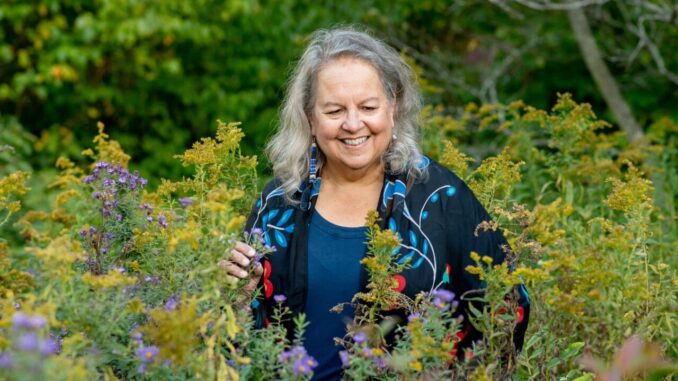
Alyssa VanPelt-Cathcart, Staff Writer
Earlier this month, author Robin Wall Kimmerer visited SUNY Oneonta where she gave a presentation as part of the Green Dragon Week where the school has a multitude of events promoting sustainability.
Although she’s recognized for her book Braiding Sweetgrass, Kimmerer spent little time of her presentation discussing the specific contents of the book. Instead, Kimmerer spoke about herself, her experiences, and where she hopes sustainability can be taken further.
Kimmerer is a botanist, professor, and an enrolled member of the Citizen Potawatomi Nation who’s also a professor at SUNY College of Environmental Science and Forestry where she teaches Environmental Biology. Additionally, she is both the founder and director of the Center for Native Peoples and the Environment.
Kimmerer shared how she was born to be a botanist but was told her views on nature were not scientific in college. In fact, her views on nature were reflective of her people and the culture she grew up in. Kimmerer believes education can be repressive and erase Indigenous culture.
Kimmerer encouraged the people she’s presented to in the past to practice gratefulness, “nagaan ge bezhig emkwaan.” When we don’t practice gratitude, according to Kimmerer, we are more likely to continue wanting what we do not need. Kimmerer explained our country is a primarily capitalistic society where people are conditioned to continue consuming beyond their needs. An example would be wanting a brand-new phone when their current phone is still usable. In response to this belief, Kimmerer asked the audience, “What does the Earth ask of us?” Kimmerer explained our planet asks us for gratitude.
However, Kimmerer is not promoting the idea of going backwards. She’s asking people to shift our view of nature from an object to another living creature. Kimmerer recognizes that people use “it” as a pronoun to identify various things in nature such as plants and animals. However, it demotes whatever is being called “it” to the status of an object. Kimmerer asks her audience to use a new pronoun “ki” or “kin” for plural. Instead of saying “what is that” it would be better to ask “who is that?” Through our more inclusive culture, society has already been including gender-neutral pronouns in our vocabulary.
At the end of the presentation, there were questions from the audience. One audience member asked how an educator incorporates pronouns for non-humans. Their goal is to bring this into their classroom and make it understandable for younger children. To this, Kimmerer responded that we need to acknowledge who is what in our world. To remind people to think of things as not objects, but as another living being.
Leave a Reply